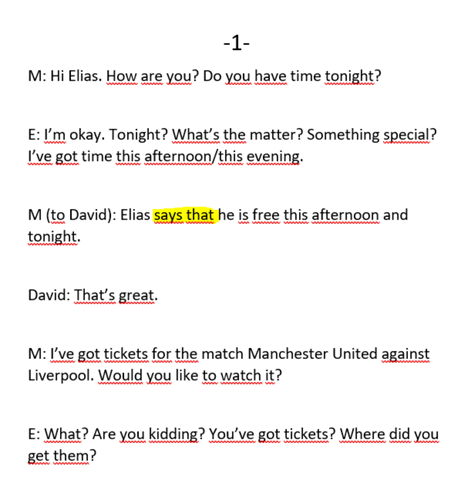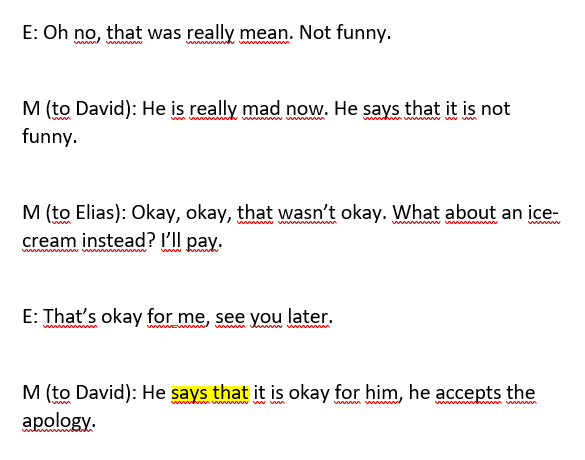Englisch indirekte Rede?
Ich habe in Englisch einen Dialog mit nh paar Kumpels zur Indirekten Rede geschrieben, aber ich bin mir nicht sicher ob wir nun etwas Falsch haben oder nicht


Müsste es bei den beiden markierten Stellen nicht eigentlich "said that" sein, oder geht auch "says". Ich hab das mit den Tenses irgendwie noch nicht ganz begriffen
1 Antwort

Hallo,
steht das Verb im Einleitungssatz im Present, Present Perfect oder Future (say, tell, remark, explain ... ) ändern sich die Zeiten nicht.
Beispiel :
She says , "I speak English". - She says that she speaks English.
Steht das Verb im Einleitungssatz im Past Tense (said, told, remarked, explained ...)
ändern sich die Zeiten wie folgt:
- aus present tense wird past tense
- aus past tense wird past perfect tense
- aus present perfect tense wird past perfect tense
- past perfect tense bleibt past perfect tense
- aus future wird conditional: would + verb
Weitere Änderungen :
- I, we, my, our zu 3. Person
- here zu there
- now zu then
- this / these zu that / those
- today zu that day
- tonight zu that night
- yesterday zu the day before
- the day before yesterday zu two days before
- tomorrow zu the next/the following day
- the day after tomorrow zu in two days’ time
- last week/month/year zu the week/mo/yr before oder the previous week/mo/yr
- a year ago zu a year before/the previous y
- next week/month/year zu the following week/m/y
Folgende Verben verändern sich normalerweise nicht :
would, should, ought to, mustn't, might, had better (lieber sollen)
could bleibt could oder was, were able to oder had been able to oder would be able to (für Zukunft)
must bleibt must oder had to, would have to (für Zukunft)
If-Sätze Type II - keine Änderung der Zeiten
Beispiel : He said, 'If I were healthier, I would go skiing.' - He said that if he were healthier, he would go skiing.
Werden Tatsachen berichtet, ändern sich die Zeiten nicht.
Beispiel : She said , 'The Seine flows through Paris.' (Tatsache, Fakt) - She said that the Seine flows through Paris.
Fragen in der indirekten Rede :
- mit Fragewörtern: when, where, why, how long, how much, who, which, what …
Das Fragewort muss in der indirekten Frage wiederholt werden.
" Why didn’t you turn off the light?“ - Mum asked why I hadn’t turned off the light.
“Where did you buy your car?” - We wanted to know where I had bought my car.
- ohne ein Fragewort muss if oder whether (ob) benutzt werden.
„Are you hungry?“ - Mother wanted to know if/whether I was hungry.
- Fragen mit shall :
Mehrere Lösungen sind möglich, je nachdem was ausgedrückt werden soll.
„Where shall we be this time tomorrow?" - Mary wondered where we/they would be that time the following day. (… wo sie wohl sein würde(n))
„Where shall I park my car?“ - Ben wanted to know where he should park his car. (… wo er sein Auto parken sollte)
- Fragen mit will :
“Will you go by train?“ - She asked me if/whether I would go by train.
Befehle, Bitten, Aufforderungen in der indirekten Rede:
„Come to me, please.“ - She asked me to come to her. / She begged me to come to her.
“Keep away from this dog.” - He told me to keep away from that dog.
- negative Befehle
"Don't smoke, boys!” - He told the boys not to smoke.
“Don’t drink and drive!” - We were told not to drink and drive.
Die Grammatik und Übungen zur Reported Speech findest du auch im Internet, z.B. bei ego4u.de und englisch-hilfen.de.
Ich hoffe, ich konnte dir helfen.
:-) AstridDerPu

OMG so ein DICKES KNUTSCHA, das machst du echt 10 TAUSEND mal besser als mein Englischlehrer
VIELEN LIEBEN DANK
(Wenn du nur wüsstest wie sehr du mir weitergeholfen hast xD)

Nein, ich widerspreche mir nicht. Es geht um die Zeit im Einleitungssatz:
Elias says / has said / will say ---------> keine Änderung der Zeiten
Elias said / ... -------------> Änderung der Zeiten
Aber moment mal: Widersprichst du dir nicht selber: "steht das verb im present perfect ändern sich die zeiten nicht" und später: "aus present perfect tense wird past perfect tense"?